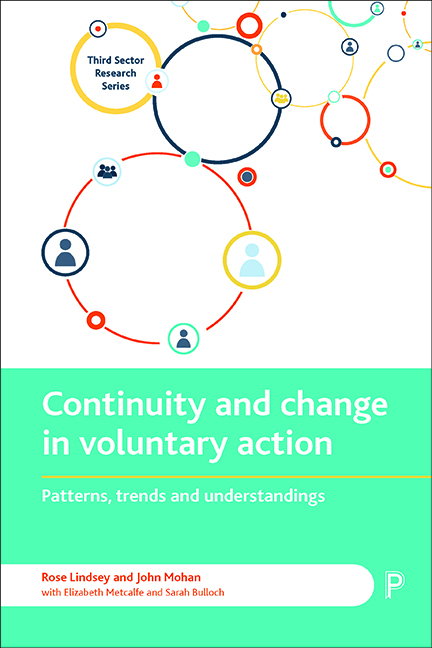Book contents
- Frontmatter
- Contents
- List of figures and tables
- Foreword
- Acknowledgements
- Notes on authors
- Acronyms
- one Introduction
- two The changing policy environment for voluntary action from 1979
- three Data: sources and definitions
- four Trends in volunteering and trends in the voluntary sector
- five Content and context of volunteering
- six Why people volunteer: contextualising motivation
- seven Volunteering trajectories: individual patterns of volunteering over the lifecourse
- eight Attitudes to voluntary action
- nine Conclusions
- Appendix: Anonymised details of writers
- References
- Index
one - Introduction
Published online by Cambridge University Press: 13 April 2022
- Frontmatter
- Contents
- List of figures and tables
- Foreword
- Acknowledgements
- Notes on authors
- Acronyms
- one Introduction
- two The changing policy environment for voluntary action from 1979
- three Data: sources and definitions
- four Trends in volunteering and trends in the voluntary sector
- five Content and context of volunteering
- six Why people volunteer: contextualising motivation
- seven Volunteering trajectories: individual patterns of volunteering over the lifecourse
- eight Attitudes to voluntary action
- nine Conclusions
- Appendix: Anonymised details of writers
- References
- Index
Summary
‘I think it might surprise even the Prime Minister if a register were to be made of everything done voluntarily in this country. Certainly society would come to a juddering halt if all the volunteers, in every capacity however small, went on strike.’ (Mass Observation Project writer, Alice Dickens, responding to the 2012 ‘Big Society’ directive)
‘I haven't got a clue what it [the Big Society] means. Nobody I’ve spoken to don't know either. If it's about our PM saying we’re all in this together, it's a laugh.’ (Mass Observation Project writer, Gillian Reddy, responding to the 2012 ‘Big Society’ directive)
‘And it all starts in the family…those who set us on our way certainly knew none of the jargon phrases and would never have spoken of “informal caring networks” when they meant family and friends, relatives and neighbours.’ (Margaret Thatcher, Speech to the Women's Royal Voluntary Service (WRVS), 1984)
‘Charitable giving is up, volunteering is up, and the Big Society is getting bigger.’ (David Cameron, 2013)
The Mass Observation Project (MOP) is an extraordinary resource for students of the behaviour and opinions of the British public. Individuals write for the project on a voluntary basis, and they do so in response to prompts, which allow them to develop a discussion of the subject in any way they wish. Those who write for MOP, often doing so over many years, are active citizens by any definition, and we begin and end this book by quoting their views on voluntary action. As our first (anonymised) writer for the MOP indicates, voluntary action is a crucial component of British society. But as the blunt response from our second writer implies, there is scepticism about the motives of political leaders calling for more engagement, and a lack of comprehension of what a policy to promote engagement might involve. This reflects a wider lack of understanding of the nature of voluntary action which is evident in both academic writing and non-academic discourse. Margaret Thatcher's view was that voluntary action was informal and local in character, deeply rooted in family and community.
- Type
- Chapter
- Information
- Continuity and Change in Voluntary ActionPatterns, Trends and Understandings, pp. 1 - 18Publisher: Bristol University PressPrint publication year: 2018

